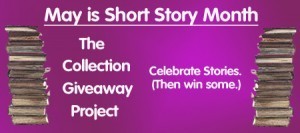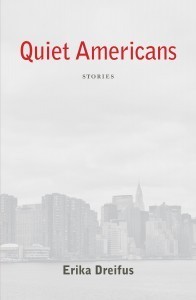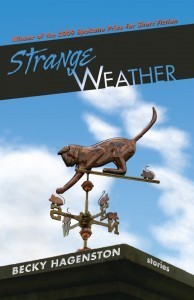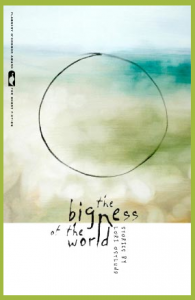Midge Raymond's Blog, page 47
May 25, 2011
Book Promo 101: How to create a successful blog
The first bit of advice most writers get about book promotion is usually: "Write a blog." And it's great advice. Yet writers often think, "Wait…I've just spent six years on this novel, and now I have to write more?"
Well, yes.
Of course, some published writers are published solely because of their blogs (there are too many success stories to name, but surely you've heard of Sh*t My Dad Says and Julie & Julia). So if you're writing nonfiction, you're at an advantage; whether it's cooking or travel or advice for moms, nonfiction lends itself well to blogging. If you're enough of an expert in something to write a book about it, you probably already have a blog, which means you've got a platform and you've got great stuff to take to agents and editors.
But if you're a fiction writer or poet, you may not have considered writing a blog. You may be far more interested in writing drafts of stories and poems than in trying to create content for blog posts and worrying about building an audience. And I feel your pain; I put off blogging as long as I could, until I finally gave in and started a version of this blog back in 2006.
When I began my blog, I was juggling a zillion things and barely had time to write as it was — and I wondered why I should write a blog when I could be writing stories. But I'm glad I did. The same way teaching helps me practice what I preach in terms of good writing, blogging is helpful in so many ways, from helping me stay on top of publishing news to getting me thinking about new writing rituals to connecting with other readers and writers. And now, I write three blogs (this one as well as The Writer's Block and the Ashland Creek Press blog), and in addition to these enhancing my own work, they're also really fun.
So here are a few tips for the beginning blogger:
- Start now. As in, right this second. Even if your book isn't due out for another year (or even if you haven't written it yet) you'll want to get started on your blog right away. You need to build content, attract readers, and develop its voice and style.
- Write what you know. Nothing fits this adage better than blogging. This is why people blog, after all — to offer their expertise to others. And it's the same reason people read blogs — to learn about things they need to know. Again, if you're writing nonfiction, you likely have a lot of knowledge to share — but even if you're writing fiction, you can keep a blog about your writing life and process, as Shary Hover does on her lovely blog. And check out Patti Marxsen's blog Manuscriptorium, in which she writes about the process of writing her novel.
- Post as often as you can — without making it too much of a chore. Posting frequently is great, but even more important is that the content is good and useful (see the next tip, below). If you treat blogging as a chore, your readers will probably notice that your heart's not in it. Blogging can be a lot of work, as any blogger will tell you. I envy those who blog 3-5 times a week, which I can never manage to do. But you don't have to post that often to have a successful blog — being interesting and relevant is more important than being frequent. That said, you'll want to blog often enough that readers know your blog is active. Try to post from one to five times a week — but even if you can only post once or twice a month, that's something. Keep in mind that short posts are okay — and probably much more likely to be read than longer ones.
- As mentioned above, be interesting and relevant. You'll want your blog to have a solid focus, but one that also allows for some breathing room. For example, if you'll look at the Categories over to the right/left of my blog, you'll see several (On Writing, On Publishing, etc.), but you'll also notice that they're all related — that is, there's nothing about iguanas or real estate. I'm focused on one area, but I blog about many aspects of it.
- Have daily/weekly themes, or ongoing topics. This very series, Book Promo 101, is an example — it's given me a way to have a little continuity as well as to keep my blog posts from being completely random. I also have my Ask Midge column, inviting questions about writing and publishing, as a way to foster a connection with readers; and I have a Weekly Writing column, in which I offer a new writing exercise every Monday as a jump-start to the week. My friend Kelli Russell Agodon has a wonderful blog on which she offers Confession Tuesday, in which she confesses her "sins," none of which are sinful but all of which we can relate to as humans and as writers; and Thankful Thursday, in which she writes an appreciation of someone or something she admires.
- Be yourself. Let your voice come through on your blog. You may not want to be quite as colloquial or as open as you are when chatting with your best friends (depending on what you talk about), but don't be shy about showing your personality. That said, keep in mind that everyone from your editor to your in-laws to your next prospective employer may be reading your blog at any given time — so be yourself, but with enough restraint to keep you out of trouble.
- Be generous. Kelli's Thankful Thursday blog is a perfect example of this: By highlighting others, you not only have material to write about but you're paying it forward. Link to other relevant blogs often; share the love. Offer to do a guest blog for another writer's blog, or invite a writer to be a guest on yours. It's a great way to discover new blogs and to help others discover them as well. I've enjoyed hosting Kelli, Susan Rich, Elizabeth Austen, and Wendy Call here on Remembering English, and I've been a guest on their blogs and many others.
- Be pretty. Make sure your blog is neat and organized, that your background colors and images are easy on the eyes, and use a normal sized, serif font. Use images and video when you can, and keep paragraphs short. Bullets and lists are handy and make for easy reading, too — remember, no one wants to get bogged down in long paragraphs of text on a computer screen. A quick note on images: Don't go too crazy (use them only if they're relevant), and make sure you have taken the photos yourself or have permission to use them. It may not seem like a big deal to snag a photo from somewhere else, but I know of writers who have done this and have had to pay damages (and it's not cheap) for using photos without permission.
- Invite comments — and reply to them. For the first year of my blog, I didn't open it to comments; I was worried I'd get a lot of spam, that freaky people would make creepy comments, or that I would get so few comments that my blog would look really sad and pathetic. But after hearing nonstop that there's no point to blogging without welcoming comments, I finally caved. And yes, all of the above did happen and still does. But I've found that it's worth it — inviting feedback and creating dialogue has fostered connections and helped build my audience.
- Think of keywords and how you can use them to draw traffic to your blog — again, only if they're relevant (if you lure readers to your site with false promises, they won't come back). And keep headlines as user-friendly as possible ("how to…" is a popular search term; this is one reason I've used it in my own headline above).
- Let people know you're there. I usually tweet each new post, offering a newsy kernel so people will click through if they're interested. I'll occasionally mention a post on Facebook if I think it'll be of interest. Giveaways are big and usually draw traffic — like the one I am hosting right now, for the Short Story Month Collection Giveaway Project! Asking questions is good, too, and will often draw comments — or, ask your readers to ask you questions, as I've done with my Ask Midge column.
- Share the love. All bloggers like comments; we like to know people are reading our blogs, and this is the best indicator. So reach out and comment on blogs that you like; this is good karma, and it's fun. Also, keep a blogroll (you'll see my Links on the right), in which you link to blogs you like, and they'll probably be glad to list you on theirs as well.
Anything to add? (See, I am following my own advice here…) Let me know if you have any blogging tips of your own to share.
Happy blogging!

May 23, 2011
Weekly Writing – Acceptance and rejection
I recently read something Sir Michael Caine wrote about being a struggling actor: "If you live an ordinary life, just think of the trauma of being sacked and applying for another job, and of having to go through that process maybe seven or eight hundred times in your life."
It occurred to me that this is very much like the life of a writer.
But as any published writer will tell you, you have to get rejected a good number of times before finally seeing something in print. And then you have to start all over again.
Today, I have two exercises for you:
Write about the worst rejection you've ever received. (This can be anything from rejection slip from a literary magazine to a poor critique in a writing group to a bad review of your book.)
Write about the piece of writing you're most proud of. (And this should have nothing to do with how many times it's been rejected or how much praise it may have gotten — this is about what you think of it.)

May 18, 2011
Book Promo 101: Twitter for writers
I admit to being late to Twitter. I just didn't get it. I didn't get why I should be, or how anyone else could be, interested in 140-character updates about people's lives. But now, not only have I "joined the conversation," as they say, I also manage several Twitter accounts (one of my own, and three for the day job), and I use the time-saver that is HootSuite (more on this later).
When it comes to book promotion, Twitter is great for some things, not great for others. And I have to admit that, as anyone who follows me @MidgeRaymond knows, my Twitter personality has suffered a bit of a dissociative identity disorder. Translation: I'm all over the place. I tweet about books, publishing, writing, about my writer friends and what they're up to, and about all sorts of other random stuff. But what I've learned about Twitter is that people like to follow you for a specific reason — for example, they're fellow writers, or they love to read. So in an effort to be more focused, I've been working on narrowing my Twitter life down to tweeting about all things bookish — and it not only saves me time but it gives followers a clear idea of why they're following me in the first place.
So how can a writer best use Twitter?
First, choose an account name that fits your goals. You might use your name, as I do, or you might use the title of your book, as author Rebecca Rasmussen does for her novel, The Bird Sisters (@thebirdsisters). Once your account is set up, find people with similar interests, news, and information to share — as soon as you begin to follow people, people follow you back, you're all receiving and transmitting tweets, and you've officially "joined the conversation."
Note: Take your time. If you follow zillions of people at once, you'll be overwhelmed by the number of tweets coming your way and won't be able to process anything for the volume. You also might look a little nutty if you're following 10,000 people and only have 2 followers yourself. So take your time, check out what people are talking about, and engage. It takes some hanging out on Twitter, but by taking the time, you'll learn what makes interesting tweets (basically by noting which ones you read and which you don't) and what all those cryptic little abbreviations mean (RT for retweet, #FF for Follow Friday, the plain old #hashtag that makes for easy searches). You'll learn how a reply is different from a direct message, and that it's polite to credit someone whose link you're retweeting.
And of course, as you're learning all this, you'll be tweeting the whole time yourself. So, what to tweet?
There are plenty of "rules" about Twitter, but I don't believe we need to follow them (mostly because everyone has an opinion on it, and the "rules" change accordingly). So tweet about what's interesting to you, and be as focused or as loose as you'd like — the most important thing is that you say something tweet-worthy. Here are a few guidelines.
- Be relevant. Offer content that your followers can use; don't just tweet about what you had for breakfast. Offer links to interesting articles and blogs, offer writing exercises and tips; offer quotes by famous authors. You'll want to tweet things not only that your followers will enjoy reading but that they'll be inspired to retweet as well.
- Be interesting. I could also rephrase this as, Don't over-promote. Even if you're on Twitter to promote your book, if every tweet is all about you and your book, that's going to bore people quickly. There's absolutely nothing wrong with showing off a good review or tweeting about an upcoming event — but be sure to produce some other content as well.
- Include links. To me, this is the most useful aspect of Twitter — finding tidbits that I haven't already seen or read. There's only so much you can do in 140 characters, and I find that the most useful, interesting, and entertaining tweets usually have something attached (and, as you'll find out quickly, you'll need to use a link shortener like bit.ly or Tinyurl).
- Network. Follow people and organizations that interest you, and start to build a network. Always do your best to respond to direct messages (unless they're only blatant sales pitches, which often they are) and follow people back when they follow you (if they are of interest to you, that is; some of them won't be).
- Try out the tools. It wasn't until I had more than one Twitter account that I tried HootSuite, and I love it. There are a great many Twitter tools out there — so many it's a little overwhelming — but they are worth knowing about, and in general, it's great to keep learning so that you can use Twitter as best you can for what your goals are. One excellent resource is MediaBistro's All Twitter, at which you'll learn about the latest tools as well as get Twitter news and tips.
- Be generous. Even though I originally joined Twitter with my own book promotion in mind, I use Twitter often to promote writer friends' events, to link to their blogs, to show off their work. And one cool way writers can promote other writers is with #StorySunday, originated by The Short Review, in which readers link to their favorite online short story of the week.
- Have fun. Be creative. Think outside the newsy tweet. Enjoy. But while you're being creative, take care not to be so "out there" as to lose followers (i.e., see "Be relevant," above).
- Keep your balance. Another important thing to keep in mind is how much time being an active Twitter user takes. To be fully engaged, you really have to spend some time reading tweets, interacting, replying, retweeting, and so forth — when you would probably rather be (and should be) writing. So allow yourself an allotted amount of daily Twitter time, and then get back to work.
And, finally, how do you know if any of it is "working"? You can attempt to measure your success in book sales, in the number of followers you have, or you can check out your "Twitter influence" with such tools as Klout. But keep in mind that for a writer, success may mean something different — such as how much you're learning and sharing, or how well you're staying connected to the online writing community. I suggest defining your own goals, and measuring your success from there.
See you on Twitter!

May 16, 2011
Weekly Writing: Dreams and nightmares
Dreams always make good material, whether it's for discovering something about yourself or providing imagery or insight into your fictional characters. With this in mind, today's writing exercise will be about your dreams … but feel free to apply these exercises to your characters if you're working on a fictional piece.
Write about a nightmare you're very, very glad was only a dream.
Write about a dream you wish could be reality.

May 11, 2011
Book Promo 101: Facebook for writers
When I learned, in 2008, that my first book would be published, I didn't even have a Facebook account. (I was also the last person on the planet to get an answering machine in the eighties and the last person to get a cell phone in the nineties.) In general, I like solitude, or being with people face-to-face. So it was with great reluctance that I signed up for Facebook, which as most writers know, is pretty much non-negotiable if you have a book out in the world that you actually want people to read.
I discovered that, even for someone who likes her solitude and face time, it wasn't difficult to get hooked on Facebook. Let's face it: It can be addictive. The good news for writers is that for at least part of the time you're on Facebook, you're doing legitimate work. The bad news: The rest of the time, you're not — and you have to balance this Facebook time with writing your next book, with not ignoring your family, and probably with your day job also.
So I wanted to offer a few Facebook tips for writers that will help you achieve that balance:
- First, consider setting up a book or author page so that you don't necessarily need to combine your author life with your personal life. (See below for more on privacy issues.) I have my own personal Facebook page, but I post the majority of book news on my Forgetting English page. While I know that most of my Facebook friends do care about the book, I also know that they have lives, and they don't need to hear about every review or every event, especially if they've already read the book or have already been to a reading. So having a separate page also allows people to "Like" the book if they want updates, or not to if they don't. Another thing to keep in mind if you don't have a separate author/book page is that you may not wish to be Friends with every reader; you may want to keep your private life more private. (Again, see below for more on privacy.)
- Make friends. Facebook is a great way to reconnect with old friends, colleagues, acquaintances — I was thrilled to have recently connected with the high-school English teacher who played an enormous role in my becoming a writer; until now, she hadn't realized I'd written a book — so this was wonderful. And Facebook provides an even better way to stay connected to new people you meet at readings and conferences (who needs business cards anymore?). So do be open to friend requests from fellow writers, readers, and others — but be sure to accept friend requests only from people you know or want to know (you can always de-friend them later, of course, but this is very awkward). And reach out and connect with readers, writers, and students yourself; try to include a personal message if it's someone you don't know or don't know well, or someone who may need to be reminded of where he or she met you. (And if your friend request isn't accepted, this article offers seven possible reasons why.)
- Don't be overly promotional; it's the quickest way to get hidden or even (gasp!) de-friended. I know I've been guilty of this on occasion — it's hard not to be enthusiastic when your book first launches or when a great new review comes out — but you always have to balance this with the danger of becoming boring, or annoying, or worse.
– You'll definitely want to show your personal side, but don't offer Too Much Information. Readers love getting glimpses into writers' lives — to a point. Stay focused on offering readers a little more than they can get from the bio on your book jacket without taking away all the mystery or freaking them out with details they may not want to know about you.
- Be respectful. If you want to attract a wide audience for your book, carefully consider political rants or offbeat humor posts before posting them. It's not that you shouldn't be who you are — you should, especially if you have strong opinions that define you; again, readers love getting to know writers — but just know that what you say affects how you're perceived.
- Keep your social media separate. Different forms of social media are, and should be, used in different ways (I'll be writing about Twitter for Writers in an upcoming post). Some believe that everything should be networked — that your blog posts and tweets and status updates should all be connected — but in fact, this can be counterproductive in that your followers/friends are then inundated with every single update in every format possible. And sometimes — especially around book-launch time when you're in promotion mode — this can be too much, and you may be hidden or de-friended from the very people you hope to engage. So while it may take a little extra time, don't bombard all your accounts with every bit of information you want to disseminate. Choose the best option for each outlet, and go from there.
- Be active. This doesn't mean spending all your time on Facebook, however. I could lose myself for hours and always find it a challenge to stay active and engaged on one hand, and to get work and writing done on the other. Try setting yourself a schedule — a half an hour in the morning, a half an hour at night; one hour a day; one day a week — whatever works. My friend Kelli Russell Agodon inspired me to try Facebook Fridays, in which I only log onto Facebook one day a week. It works very well in general, but I do cheat when I have book news to share or vacation photos to show off. Find a rule that works for you, but give yourself room to be flexible about it.
- Safeguard your privacy, and that of your friends and family. Facebook has gotten a lot of bad publicity when it comes to privacy issues, but in fact, it's often the users themselves who offer up far more information than Facebook does. The first line of defense is not to become friends with anyone you don't know personally — but of course this isn't realistic for authors trying to promote books; the goal is to reach out and connect with readers everywhere. So you may be opening up your Facebook profile to a lot of strangers — most of whom will be wonderful people, some of whom may not be. As this Wall St. Journal article reports, it's possible that your Facebook page may be examined for anything from jury selection to custody battles — providing another good reason not to reveal too much to the general public or to friend anyone you don't know. And check out this article about how much you may be revealing to criminals on Facebook without realizing it.
So here are a few good rules to go by in terms of protecting your privacy while being open to connecting with readers:
- Do not include on your Facebook profile anything that can be used to access any of your personal information (including email, banking, day job passwords, healthcare accounts, etc.). For example, I don't include anything in my profile that you can't find on my web site or blog. And, yes, this will exclude many of the things that make Facebook fun, such as your birthday, your pets' names, your hometown, your alma mater, etc. But think about it: The passwords you use and/or security questions you answer to access your bank accounts or credit cards usually have to do with things only you will know (supposedly). So consider this before you share it all online.
- Adjust your settings to keep certain things private: your friend list, your email, your phone number, your address; any of these can be used to hack into a bank account either by phone or online. (And I'm not just being paranoid here; I've seen it happen.)
- Disable the Places feature that "checks you in" — which essentially means that everyone on Facebook knows exactly where you are when you post. If you're on a book tour, naturally you'll be posting about that — but do keep in mind that all of your connections will then know you're out of town and for how long. Again, avoid putting your address anywhere, especially if your place will be empty while you're away. And while you're at it, you might also mention that you have a big, hulking neighbor keeping an eye on your home and dog-sitting for your Dobermans.
- Enable https, which is under Account Security — this enables secure browsing and will help prevent your account from being hacked into (surely I'm not the only one who's gotten emails from friends saying, "Sorry, that nasty video wasn't from me — my account was hacked!"). This is especially important if you're using a wireless network or a public computer.
- Take care with apps and games. For increased privacy, one thing you'll want to do is uncheck the boxes in the Info Available to Applications setting — Facebook encourages you to check all the boxes, saying "the more you share, the more social the experience," when in fact, the more you share, the more vulnerable you are. And as this article outlines, even those fun "games" people enjoy on Facebook, like "25 Things About Me" and "Who Knows You Best" can reveal information that you don't want the wrong people to have, especially if you use any of this sort of information to log into bank accounts. Remember that recent one about describing your first car? I thought that was a fun one too … until I noticed that this is one of the security questions my bank uses.
- Be careful what you post. If that WSJ article above isn't eye-opening enough, I've also read about health insurance companies using Facebook to deny insurance claims. So be aware that your updates and photos may be telling others … and share only what you don't mind the whole world knowing, just in case.
All that said, don't be so paranoid that you don't have fun on Facebook — in fact, the most fun for me on isn't necessarily the ability to share but the ability to chat with others and to enjoy their photos and news. And perhaps this is the best way to view social media, especially as an author who uses Facebook in part for book promotion: To remember that while it's a great way to get the word out, it's less about self-promotion than about about the give-and-take.

May 9, 2011
Weekly Writing: Gossip
This is a favorite exercise I like to give to fiction writers — it's great for allowing you to see your character from another POV — and it's also so much fun because it often leads to great conflicts. I've adapted it below so that nonfiction/memoir writers can enjoy it too.
Write about two characters gossiping about your protagonist.
Write about a time you overheard someone talking about you without knowing you could hear.

May 5, 2011
Bookstore geek: Bloomsbury Books
In my continuing coverage of awesome indie bookstores, I'd like you to meet Bloomsbury Books of Ashland, Oregon.
This lovely bookstore is in the center of town, and as well as offering a great selection of books and magazines, Bloomsbury is also a wonderful gift shop, with cards, games, and (very important) Theo Chocolate, among other delights. The staff is friendly, knowledgeable, and helpful, and the store features frequent author events (I'll be reading there on Thursday, May 12, at 7 p.m., if you happen to be in town).
Yet another thing to love about Bloomsbury is the cafe upstairs, with its organic selections, gigantic comfy chairs, and a gorgeous outdoor patio and garden (the cafe has a "no cell phone policy" of which I am a huge fan). I've spent much of the winter there on writing dates with my writing buddy, and now that the weather is nice enough to write outside, I'm hoping to spend most of the summer here as well.

May 3, 2011
Virtual Book Tour: Beyond the Margins
Many thanks to Randy Susan Meyers for hosting me at the fabulous Beyond the Margins blog today, where the topic is Learning to Disconnect, and how we writers need to find that challenging balance of writing and promoting our work.
Join me at Beyond the Margins today, where you'll learn a few tips for how you can best achieve that delicate balance.

May 2, 2011
Weekly Writing: Short story inspiration
In honor of Short Story Month and the Short Story Month Collection Giveaway Project, I'm turning to short stories for inspiration for this week's writing exercise:
1. Pull one of your favorite short story collections off the shelf.
2. Open to a random page.
3. Write down the first line on that page. (For example, I've just picked up Lori Ostlund's The Bigness of the World, and my random line is: "They had not expected the desert to be like this…")
4. Write a story of your own based on this one line — erase the original story's context from your mind, start over, and have fun.

May 1, 2011
Short Story Month Collection Giveaway Project
Welcome to Short Story Month!
This year, I am happy to be joining other bloggers in the annual Fiction Writers Review Collection Giveaway Project, a community effort by lit bloggers to raise attention for short story collections. FWR Contributing Editor Erika Dreifus suggested FWR as a home for this project last year and will not only be participating on her own blog, but will also be helping FWR run the project. And those of you who are fiction bloggers yourselves, click here for information on how you can participate as well.
The only difficult part about this for me has been choosing a collection to give away…but I've finally narrowed it down. To three.
First, I'm happy to be giving away Erika's own collection, Quiet Americans, out this year and well worth the long wait! I first met Erika in a bookstore outside Boston, where we did a reading together as finalists for a short story award. So I've enjoyed her work for many years and was thrilled to have a whole collection of her haunting and thought-provoking stories to curl up with this winter. From a high-ranking Nazi's wife and a Jewish doctor in prewar Berlin to a refugee returning to Europe as terrorists massacre Israeli athletes at the 1972 Munich Olympics, the characters and conflicts that emerge in Quiet Americans reframe familiar questions about what is right and wrong, remembered and repressed, resolved and unending.
I'm also happy to be giving away Becky Hagenston's collection Strange Weather, which received the 2009 Spokane Prize for Short Fiction and was published by the fabulous Press 53. As with Erika, I'd already been acquainted with Becky's work and with some of these stories through the many literary magazines they've appeared in, and I loved having the chance to overdose on them with this collection, which is nearly impossible to put down. From the visceral tension in the mother-daughter relationship in "Trafalgar" to the wonderfully witty ghost story "Anthony," these stories offer us a delightful mix of magic and reality, while never losing their grip on the truths that draw us to stories in the first place.
And finally, I'm delighted to offer the wonderful collection The Bigness of the World by Lori Ostlund, now out in paperback. Winner of the Flannery O'Connor Award for Short Fiction, this beautiful book introduces us to characters venturing out into a world in hopes of escaping their troubles, only to find that life remains as complicated as it was before they left. You may have already read "All Boy" in Best American Short Stories 2010 (two additional stories from the collection, "Bed Death" and "Talking Fowl with My Father," are on the list of Other Distinguished Stories) — and if you've already read Lori's work, you'll only want to read more.
To be entered to win, leave a comment on this post any time from now to midnight (Pacific time!) on Tuesday, May 31, 2011, at which time I'll use a random number generator to select three lucky winners.
Happy Short Story Month! Go forth, read stories, and celebrate.















